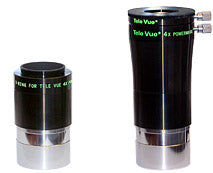Tele Vue Powermate 4x - what's all this talk about Powermates?
Unique Benefits and Applications for Powermates
- Vignetting, edge field aberrations and pupil movement - all introduced when using Barlows with long focal length eyepieces, are minimized.
- Telecentric operation (field rays leave parallel to optical axis, unlike Barlow lenses which diverge rays). This is ideal for Hydrogen-alpha filter use such as with Daystar models.
- High performance for image amplification, CCD or film (some of the finest Earth-based planetary imaging is being done with Powermates ).
- Flexible for visual and imaging with all types of telescopes and eyepieces. Essentially Parfocal, and with nearly constant magnification regardless of image distance behind top surface (except 5x model which increases 1x for every 35mm of image distance increase).
- Higher magnifications are possible with high optical performance compared to "doubling up" Barlows.
- All will reach parfocal point in star diagonals, except for the 2", 2x which comes very close.
In addition to full multi-coating, Powermates include other Tele Vue special touches such as safety undercuts where practical on the chrome barrel and captive lock screws that can't fall out, and filter threads. Tele Vue's 100% QC program at f/4 insures that the Powermate 4x will add dramatic power (and NOTHING ELSE) to your favorite eyepieces.
If, for example, you own a 24mm Panoptic, you'll have the power of a 12mm focal length eyepiece with the 2.0x Powermate, 9.6mm with the 2.5x Powermate, a 6mm with the Powermate 4x, or a 4.8mm with the 5x Powermate!
Imaging the Solar System with Powermate 4x
Some of the finest Solar System images have been made with Powermates. Used singly or stacked, Powermates help any scope achieve the long focal-length required to image details on Solar System bodies. The increased image scale allows for imaging without an intervening eyepiece -- like in prime focus photography. Powermate T-Ring Adapters fit on the Powermate lens assemblies to allow attachment of your camera's T-Ring or other T-threaded imaging accessory.
For astro-imagers, the above chart indicates the magnification for each Powermate (2x, 2.5x, 4x & 5x) as a function of distance from the Powermate top surface to the imaging surface (CCD or film).
Powermate 4x with 2" barrel diameter
The Powermate 4x is a better choice for 2" diagonals than Barlows, since it is nearly Parfocal. Threaded for 48mm filters and its performance is excellent with every 1¼" and 2" eyepiece Tele Vue makes (yes, even the 31mm Nagler Type 5!). Both the 2" eyepiece holder and the special 2" flat top adapter use brass clamp rings for secure operation. And, it also has a very unique feature: you can unscrew the 2" eyepiece housing and screw on a special T-ring adapter for solid, compact attachment of CCD or camera equipment.
Excellent with long eye-relief, 2" eyepieces. Using the 4x model, imagine the quality of a 35mm Panoptic at 8.8mm with 25mm of eye relief! The Powermate is NOT a Barlow so the Panoptic-Barlow Interface is not needed! The 2" Powermate fits all the way into 2" Star Diagonals, requiring minimal refocus compared to a 2" Barlow.
Note for Dobsonian/Newtonian Owners
When using Tele Vue's Paracorr coma corrector andPowermate 4x, first insert the Powermate into the focuser, then the Paracorr into the Powermate.
Al Nagler's 4-element concept, continues the tradition of full-field sharpness with optimum aberration control. Like long eye-relief? Retain the eye-relief of long focal length eyepieces, while at high power. Enjoy, for example, the sharpness and comfort of the 32mm Plössl at up to 5 times the power!
Powermate 4x vs. Barlow
To understand the Powermate, we must first understand the Barlow lens. Barlows amplify the power of a telescope. They can be considered "focal reducers" for eyepieces, or "focal extenders" for objectives. Terence Dickenson, in his Barlow test report in Sky and Telescope, July 1997, says: "Technology has erased the old objections. A modern Barlow will not degrade your telescope's optics. Anyone telling you otherwise is using outdated information. Moreover, the highly regarded Nagler eyepieces and their clones have built-in Barlows, ample evidence that the lens is not some detrimental intruder." Thanks, Terence, for laying the myth of the degrading Barlow to rest.
A high quality Barlow must be properly designed and manufactured in order to avoid compromising a telescope's colour and spherical aberration corrections. The "invisibility" of Tele Vue's 2-element Barlows has been noted in test reports in the astronomy magazines. However, by the nature of its negative power lens, a Barlow will do more than just increase magnification, regardless of the number of elements.
The diverging rays leaving the Barlow result in moving the exit pupil further out, thereby extending the eye relief. In short to medium focal length eyepieces the change is not noticeable. However, in the case of long focal length eyepieces, the increase can be significant and not without performance consequences.
No Vignetting
Vignetting can occur due to the altered ray path, when the eyepiece's lenses are not large enough in diameter to allow all the rays to make it through. Shorter Barlows, or ones with too much magnification, only exacerbate the problem because the ray path entering the eyepiece is steeper.
We had to go beyond the Barlow concept to achieve the goal of a compact, high power, fully corrected image amplifier. The Powermate consists of a negative doublet plus a positive "pupil-correcting" doublet. This 4-element system provides the magnifying function of a Barlow without its limitations by restoring the field rays back to their original direction, as if the Powermate were not there. The result is a pure magnification increase.









